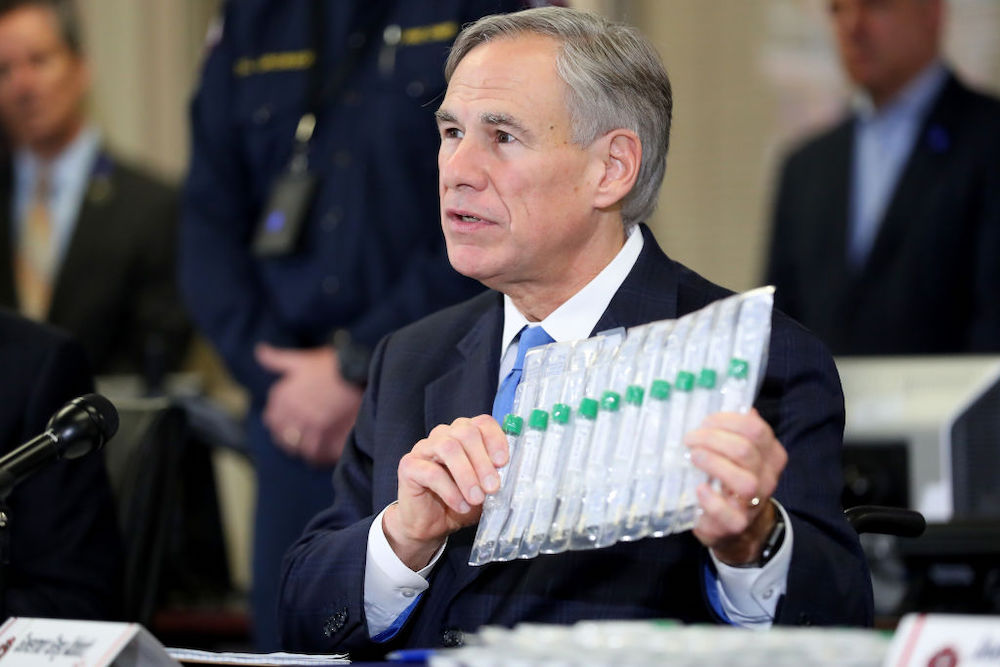- Texas has bought medical technology from companies, including PerkinElmer, to help boost its COVID-19 testing capacity.
- PerkinElmer is a medical equipment company with a focus on social and environmental impact.
- Texas is one of several states that is slowly allowing certain businesses to open after the outbreak. The move comes as the U.S. has registered over one million cases of COVID-19 infections.
As several states struggle to find ways to safely reopen following the pandemic, Texas is turning to PerkinElmer Inc., a medical equipment company with a track record for positive social and environmental impact, to help boost its COVID-19 testing capacity.
“If we remain focused on protecting the lives of our fellow Texans, we can continue to open the Lone Star State,” said Texas Governor Greg Abbott in prepared remarks.
On Monday, Abbott issued an executive order allowing certain businesses like retail stores, restaurants, movie theaters and malls to partially open their doors to the public on May 1, in part due to increased testing. The venues must limit the number of patrons they admit to 25% of their listed occupancy to promote social distancing and avoid exacerbating the outbreak.
Texas is one of several states, including Georgia, that are cautiously moving to partly reopen their commercial sectors that have been hurt by the pandemic. The moves come as the U.S. has registered over one million cases of COVID- 19 infections as of Tuesday, according to a tally by the New York Times.
Most states view tracing and isolating people infected with COVID-19 as a critical step to economic recovery and are moving to boost their capacity for testing.
California has partnered with companies including Verily and OptumServe to increase its testing capacity. Meanwhile, the Texas Department of State Health Services has been using a new COVID-19 test from PerkinElmer since early April that increases its laboratory capacity to process specimens to about 800 per day, up from about 150 tests a day previously, according to a state report.
There are about 30 large laboratory equipment manufacturers in the U.S. and executives say that demand for COVID-19 testing will provide ample business opportunities, since companies have pioneered different technologies that can be complementary, says Masoud Toloue, the vice president and general manager for diagnostics at PerkinElmer.
“COVID-19 has shown no boundaries and it’s imperative for all hands to be on deck in effectively addressing this pandemic,” Dr. Masoud told Karma. “We are pleased to continue playing an active role in expanding the availability of collection, extraction, testing and services to address demand. We are steadfastly working with public health and private labs across the globe in ensuring testing needs are met.”
PerkinElmer, a listed company on the New York Stock Exchange with about $2.9 billion in revenues last year and based in Waltham, Massachusetts, provides diagnostic equipment for customers including laboratories, clinics, hospitals and academic and government-run research institutes around the world.
In 2018, Morgan Stanley picked PerkinElmer as one of its Top 30 stocks globally “that offer a strong fundamental investment case at the same time as creating a positive social or environmental impact.”
The company views food safety testing and the detection of pollutants in the environment as business growth areas, according to its latest investor brief. PerkinElmer’s diagnostics tools are increasingly being used to detect toxins in milk products in China. The company also makes equipment that helps survey the world’s oceans for microplastics.
Quest Diagnostics Inc. recently announced that it will process COVID-19 antibody tests using tests from EUROIMMUN, a PerkinElmer company. The tests may help identify people who have developed immunity to the virus. PerkinElmer also manufactures tests that can detect an ongoing COVID-19 infection.
As part of their plan to reopen their economies, some U.S. states are considering issuing immunity certificates to people who have antibodies against COVID-19.
However, most recently, the World Health Organization cast some doubts on those plans as scientists are unsure what duration or level of protection that antibodies confer unto people that have recovered from an infection.
“There is currently no evidence that people who have recovered from COVID-19 and have antibodies are protected from a second infection,” according to a WHO statement.
Photo by Tom Pennington/Getty Images






















